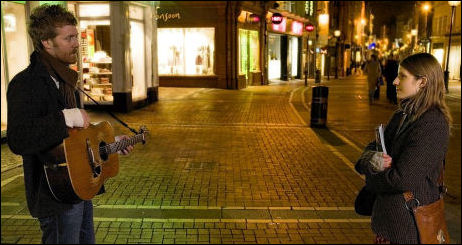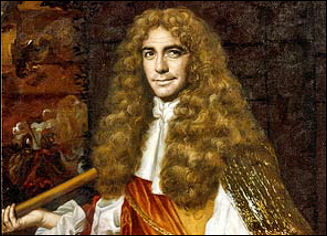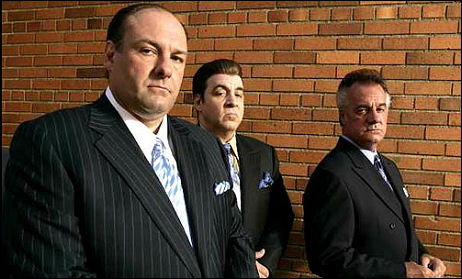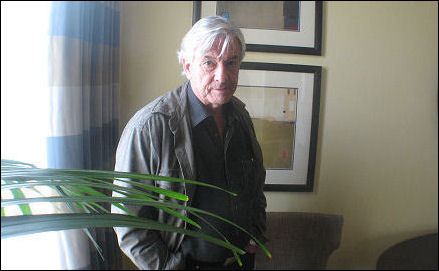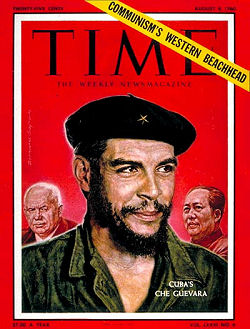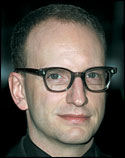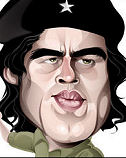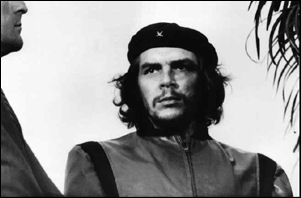I’ve recently read Peter Buchman‘s scripts of The Argentine and Guerilla (both dated 10.4.06), the two-part Che Guevara saga that Steven Soderbergh will begin filming sometime in May with Benicio del Toro in the title role, and they’re awfully damn good — a pair of lean, gritty, you-are-there battle sagas, one about success and the other about failure. Together they comprise a strong and properly ambiguous whole.
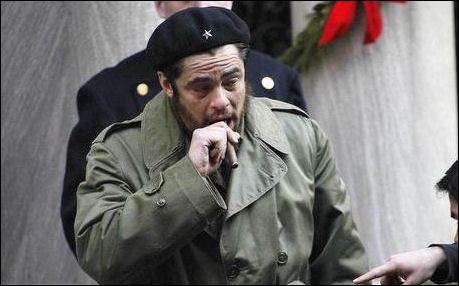
Benicio del Toro as Ernesto “Che” Guevara
Obviously political and terse and rugged, the two scripts are about how living outside the law and fighting a violent revolution feels and smells and chafes on a verite, chapter-by-chapter basis. They’re about sweat and guns and hunger and toughing it out…friendships, betrayals, exhaustion, shoot-outs and trudging through the jungle with a bad case of asthma. What it was, how it happened…the straight dope and no overt “drama.”
If Soderbergh does right by what’s on the page, The Argentine and Guerilla (which Focus Features will open within weeks of each other in 2008) will have, at the very least, a Traffic-like impact. The films will almost certainly be Oscar contenders, and you have to figure that del Toro, playing a complex, conflicted hero who ends up dead (i.e. executed in a rural schoolhouse by a drunken Bolivian soldier), will be up for Best Actor. The Guevara role is too well written (nothing but choice, down- to-it dialogue from start to finish) and del Toro is too talented an actor — it can’t not happen.
In fact, I can easily imagine critics comparing Soderbergh’s two-part saga to Coppola’s The Godfather and The Godfather, Part II — not necessarily in terms of quality or emotional-impact issues but because they convey two distinct and disparate sides of Guevara’s saga, the up and the down, in the same way that Coppola’s films are about the youthful ascent and increasingly malignant, middle- aged descent of Al Pacino‘s Michael Corleone.
The Argentine is about Fidel Castro and Guevara’s forces leading their ragtag anti-Batista army from their arrival on Cuban shores in 1956 until their victory in late ’58. Guerilla is about Guevara’s failed attempt to spark a revolution in Bolivia in 1967. The former is about struggle, strength and triumph, and Guerilla is its opposite number — the same fight minus the wind in the sails.
Reading them took me back to a 3.19.07 “Page Six” item that preemptively attacked the Soderbergh venture, which I read as a case of knee-jerk hostility due to the fact that the N.Y. Post, which publishes the column, is a right-wing paper that sometimes lets its agenda seep into the writing.
The item vented concerns shared by right-wing anti-Castro Cubans (i.e., the Andy Garcia brigade) that the two films will portray the famed revolutionary in glowing heroic terms without focusing on his brutal, darkly dogmatic side that manifested when Guevara was put in charge of Havana’s La Cabana fortress and oversaw the trial and execution of 600 political prisoners.
“To witness such butchery is a trauma that will accompany me to my grave,” Jose Vilasuso, a lawyer who worked under Guevara, is quoted as saying. “The walls of that medieval castle received the echoes of the rhythmic footstep of the squad, the clicking of the rifles, the sorry howling of the dying, the macabre silence.”
In this respect the Cuban righties are not that wrong. The Argentine contains no La Cabana depictions — nothing about what happened in the wake of Castro and Guevara”s triumph, and no reflections at all about the kind of country Cuba became under Castro since then. Guerilla alludes to Guevara’s frustration with being a top-level Cuban comandante, but no specifics are offered. (Oddly, the script doesn’t have any scenes of Guevara visiting New York City in December 1964, which Soderbergh filmed last year.)
And Guevara is clearly portrayed in a flattering light. As far as these screenplays represent what the films will ultimately be (the rule-of-thumb being that scripts are only blueprints), Buchman’s Guevara is an imperfect but admirable fellow — com- plex and dogged, tenacious but plagued by asthma, brave and strong but capable of error, rigid and dogmatic and, in Guerilla, oblivious to the basic shape of things, and yet basically decent and humane and certainly courageous to the last.
And yet the scripts don’t feel like a buff-and-polish job. (Not to me anyway.) Guevara is shown as a right guy, but they don’t attempt to portray a revolution or the Cuban culture or anything sweeping about the wisdom or ultimate goodness of Latin American socialism. They’re about an intelligent, willful, resourceful hombre and his allies slugging it out in a pair of tough battles. No heartfelt speeches, no playing to the galleries — just the rough-and-tumble.
Soderbergh will shoot the films in tandem, using mostly Spanish dialogue. Javier Bardem (as Castro?), Franka Potente, Benjamin Bratt and Benjamin Benite- zare were reported by Variety last October to be “in talks to play key roles.”
The producer is Laura Bickford, who began working on the project with Del Toro and Soderbergh five or six (seven?) years ago, in the wake of their joint Traffic collaboration. The lead financier is the Paris-based Wild Bunch, which “also hung in through twists and turns that included Terrence Malick committing to direct and then dropping out to make The New World.”



